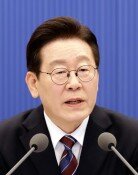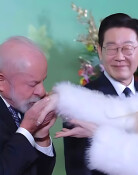Effects of fielding single opposition candidate
Effects of fielding single opposition candidate
Posted October. 30, 2012 04:24,
Moon Jae-in, the presidential candidate of the main opposition Democratic United Party, has proposed four principles in unifying the opposition camp`s candidate, including a policy-centered value alliance, public participation in electing the candidate, and the candidate keeping his or her own party. He apparently made this announcement public to begin discussion on the candidate election with independent runner Ahn Cheol-soo. Moon`s camp believes that such talks should start soon given the deadline of Nov. 25 and 26 for registration of presidential candidates.
Moon is mulling public participation in the election of the unified candidate, which was done in his party`s presidential primary. Such a system has received criticism, however, due to the use of mobile media and devices by supporters of the late former President Roh Moo-hyun. In the party`s presidential primary, then adviser Sohn Hak-gyu and others had raised the problem of mobile use in blasting pro-Roh hegemonism. Moon backers say talks on a unified opposition candidate must start early next month since candidate election will take about two weeks. While the method is unfair, Moon might try to do it to his benefit. Whether Ahn will agree to it is unclear.
Ahn`s camp agrees on the need for a unified candidate but is against being pushed on it immediately. The independent is in a more advantageous position in gathering public support than Moon, who is stuck in a pro-Roh mantra. Time is on Ahn`s side, according to his camp. But just 50 days are left until the presidential election, and Ahn has yet to announce a roadmap for the unified candidate and remains vague on his stance about the matter.
With both candidates calculating gains and losses on timing and method, they are being negligent on more important issues such as national administration and capability. Since the 1987 presidential election, fielding a unified candidate has been a powerful tool for victory. That year, neither Kim Dae-jung nor Kim Young-sam was elected because of the failure of the two candidates to join forces. Ten years later, however, Kim Dae-jung and Kim Jong-pil teamed up and the former won the presidency. In 2002, Roh Moo-hyun and Chung Mong-joon also cooperated to help Roh win. The joint administration created by Kim Dae-jung and Kim Jong-pil pledged a constitutional amendment to adopt the cabinet government system but this was never realized. In 2002, Chung suddenly withdrew his support of Roh a day ahead of the election. Candidate unification should be prevented from bringing chaos to the presidential election.
Forces loyal to Park Geun-hye, the presidential candidate of the ruling Saenuri Party, seem relatively less affected by the candidate merger bid of the opposition, and even has groundless optimism. Election experts, however, warn that if Park fails to move the public with a story that surpasses the opposition`s candidate merger, she will have difficulty earning more support. The people have lost interest in boring election campaigns, changing channels when presidential candidates appear on a TV program. Because of this negative situation, opposition forces are trying to achieve breakthrough via a unified candidate. So what Park will come up with to counter this is also gaining attention.







